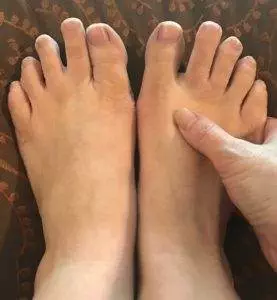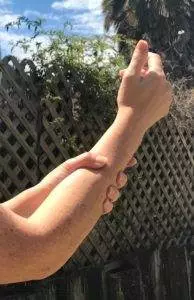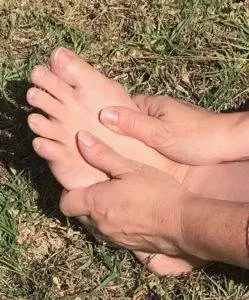By Qineng Tan, L.Ac., Ph.D.

Neuropathy pain and tingling, often in the hands or feet, is caused by damage to the nervous system. Dysfunction of the sympathetic nervous system can also interfere with autonomic internal processes like blood pressure and digestion. Relieve the effects of nerve damage with integrative care that includes acupuncture and TCM.
Neuropathy refers in general to the dysfunction or disease of one or more nerves, causing pain, sensitivity, and/or degenerative atrophy in parts of the body, usually the extremities. The most common form of neuropathy is peripheral neuropathy, in which damage to the peripheral nervous system–the signalling system that allows the brain and spinal cord to communicate with the rest of the body–leads to a breakdown in communication.
Peripheral neuropathy is believed to affect about 30 million people in the U.S. In some cases, neuropathy causes severe pain and can be disabling. Neuropathy in feet may be the most recognizable form of this condition, but different kinds of nerve damage can affect many parts of the body.
Symptoms of neuropathy vary widely from person to person, so it can be challenging to get a specific diagnosis. Some types of neuropathy develop slowly over many years (chronic neuropathy), while others can come on quite suddenly (acute neuropathy). There is currently no cure for neuropathy, and conventional medicine has limited ways of addressing the underlying causes of most neuropathies. Medical treatment mostly focuses on relieving painful symptoms with medications.
Studies have shown that acupuncture and TCM present an effective form of complementary or alternative treatment that can work upon the deeper dysfunctions that led to the degeneration of the nervous system in the first place.
Symptoms of Neuropathy
The signs of neuropathy can be subtle or severe, and appear in widely different combinations. The most common symptoms of peripheral neuropathy include:
- Tingling or numbness in hands and feet
- Burning or sharp pains in the limbs
- High sensitivity to touch, temperature
- Conversely, an inability to sense temperature or external pressure–loss of sensation
- Lack of coordination, balance, tendency to fall
- Muscle twitching, cramping, or weakness
- Lightheadedness or dizziness when rising to standing position
- Problems with control of the bladder and/or bowel
- Loss of sexual function
- Unintentional weight loss
Diagnosis of neuropathy usually involves a combination of electrodiagnostic tests to measure the electrical activity of nerves and muscles and blood tests to determine deficiencies, toxicity and/or abnormal immune responses. Quantitative Sensory testing can help determine the extent of nerve damage that exists, and Autonomic testing can assess whether there is damage to the autonomic nervous system, which controls things like blood pressure and sweating to manage body temperature.
Top 10 Types of Neuropathy
In general, the major types of neuropathy are known as: peripheral, proximal, cranial, autonomic and focal. There are over 100 different kinds of specific neuropathies that affect different parts of the body in various ways, depending on where nerve damage has manifested. The most common types are discussed in detail below.
-

carpal tunnel syndrome is a type of compression neuropathy Peripheral neuropathy – The peripheral nervous system transmits messages from the brain and spinal cord to the rest of the body.The somatic nervous system is made up of the cranial nerves and spinal nerves, which send messages between the brain and the periphery regarding voluntary movements, such as rising, walking, and picking up objects. When these systems sustain damage and become compromised, symptoms such as tingling, burning, numbness in the extremities, extreme sensitivity to touch, muscle weakness, loss of balance and coordination, or even paralysis can result.
- Autonomic neuropathy – The autonomic nervous system controls the body’s basic functions, such as the pumping of blood, the emptying of the excretory organs, and the digestive processes. When the small fibers of nerves lose their function, the fine movements necessary for the contraction of blood vessels are compromised, leading to inabilities of the organs to perform their usual activities.
- Sympathetic Nervous System Neuropathy – The sympathetic nervous system controls the body’s ability to react under urgent circumstances, triggering the “fight or flight” response. The rush of hormones causes a rise in heart rate and extra blood to flow to the muscles. Problems with the nerves that control this response are especially common in patients with diabetes and can have a negative impact on cardiovascular function, impairing coronary blood flow.
- Central neuropathic pain syndrome – due to damage to the central nerve system or spinal nerves, usually caused by a spinal cord injury, brain injury, or stroke. Can cause sharp, burning pain in localized areas, or throughout the body. Sometimes accompanies other chronic conditions like multiple sclerosis or Parkinson’s disease.
- Compression mononeuropathy – Damage to a single nerve can cause pain, numbness, and/or loss of use of a specific part of the body, as in carpal tunnel syndrome, which affects the hand, wrist and arm, cubital tunnel syndrome (ulnar neuropathy), in which ulnar nerve entrapment compresses the ulnar nerve of the elbow, radial tunnel syndrome compressing the radial nerve, and femoral nerve dysfunction, which affects the leg, causing numbness in thigh or femoral nerve pain.
- Neuropathic arthropathy or Charcot’s Joint – a progressive condition that causes severe damage to the bones, cartilage, and soft tissues of joints, usually the ankle and foot area. This extreme form of arthritis occurs when a person has nerve damage to the extent that they cannot feel the grinding of bone on bone.
- Neuropathies of the 12 Cranial Nerves – damage to the nerves of the brain and brainstem can lead to dysfunction of the muscles that manage the movements of the eyes (optic nerve), or Bell’s Palsy, which affects the muscles of the face.
- Thoracic and Lumbar Radiculopathy – A rare type of neuropathy, pinching or damage of the spinal nerves can cause pain around the chest (thoracic) or pain that radiates from the lower back (lumbar).
- Proximal Neuropathy – causes pain and weakness in the muscles of the hip, thigh and/or buttock, usually on just one side of the body.
- Unilateral Foot Drop – compression of the peroneal nerve in the leg causes difficulty in lifting the front part of the foot. People with this type of neuropathy, sometimes called “drop foot,” may drag their toes along the floor as they walk.
What Causes Neuropathy?
Chronic neuropathy is usually a secondary condition related to some other form of chronic disease. Diabetes is the most common and well-researched cause of neuropathies. Upwards of 60% of people with diabetes experience some form of nerve damage. Over time, high blood sugar levels cause weakening of the blood vessels that provide nutrients to nerve endings.
The main factors that can lead to various neuropathies include:
- Diabetes
- Traumatic injury that damages nerve tissues
- Side effects of medications or chemotherapy
- Autoimmune and inflammatory conditions
- Cardiovascular disease – narrowing of the arteries
- Kidney problems
- Poor diet, overuse of alcohol
- Exposure to toxins
Damage to peripheral nerves is a common side effect of chemotherapy treatment for cancer. Many people who undergo chemotherapy experience some form of neuropathy that continues long after the round of treatment has ended.
Medical treatment of neuropathy often involves the management of the related chronic conditions, especially diabetes, with lifestyle changes. Proper management of diet can certainly help prevent and improve neuropathy symptoms, but it is difficult for most medical practitioners to spend much time counseling patients on nutrition and behavioral modification. Medications such as Lyrica, Neurontin, Cymbalta and Elavil are often prescribed to help manage the painful symptoms of nerve damage. These can help dull pain, but do not fundamentally treat the condition, and possible negative side effects include leg swelling, weight gain, and fatigue.
Acupuncture and TCM offer a safe alternative for treating neuropathy symptoms stemming from diabetes, chemotherapy, inflammatory and other conditions.
How Does Acupuncture Help Neuropathy?
According to TCM theory, peripheral neuropathy is related to dampness hampering the smooth flow of Qi and blood to the limbs. Acupuncture treatment, therefore, will focus both on resolving the underlying condition causing the dampness to accumulate and clearing the blockages in the energy pathways (meridians) so that Qi and blood can move freely again.
Nutrition is an integral part of TCM, and a qualified acupuncturist will be able to give specific advice for each individual on how to modify diet to help address underlying conditions affecting the health of the nervous system. Your acupuncturist will likely also introduce herbs that provide additional nutrients to balance the system. These medicinal herbs are sourced from plants and contain properties we do not get from the and vegetables we eat on a daily basis. TCM considers herbal supplements to be an important extension of the diet to enhance health.
One study conducted with patients with Type 2 diabetes compared results of patients using medications only versus those who also received acupuncture treatment. The acupuncture group saw vast improvement over the medication-only group, not only in relief of painful symptoms, but in disability scores as well.
A study comparing a group of patients who got acupuncture versus those who received sham acupuncture showed that the people who had real treatment showed improvement in sensory and motor function in a fifteen-day period.
Another study designed to look at the long-term effects of acupuncture on neuropathy pain showed that people who had received ten weeks of acupuncture treatment were able to reduce their use of medications, and the majority of patients reported that they were still feeling the benefits up to a year later.

Top 5 Tips for Care of Neuropathy in Feet
People with neuropathy are highly susceptible to seemingly small injuries to the feet that can quickly turn into serious infections. Because sensation is diminished, sometimes a small stub is not felt until it has already become problematic.
- Wash feet and dry them carefully every day. Check for any sores or swelling, and address immediately with ointment and appropriate bandaging.
- Massage your feet every day. Rub the tops and bottoms until they are warm. This encourages circulation and stimulates good sensitivity.
- Wear socks and shoes that provide support and cushioning without compression or irritation.
- Move the feet regularly. Even when you must sit for long periods, make a point of removing your shoes to stretch and wiggle your toes. Elevate the feet when possible.
- Don’t go barefoot or wear flimsy shoes. It is so easy to injure the feet this way, and you may not be conscious of a small abrasion until it is already infected.
Acupuncture Near Me for Neuropathy
Our doctors at Art of Wellness have over 30 years of experience helping patients with chronic pain and neurological conditions. If you or a loved one has been suffering with neuropathy pain, please contact us to set up an initial consultation. We partner with you and other members of your healthcare team to provide the very best in integrative care.
*This article is for education from the perspective of Traditional Chinese Medicine only. The education provided by this article is not approved by FDA to diagnose, prevent, treat and cure human diseases. It should not stop you from consulting with your physician for your medical conditions. Traditional Chinese Medicine is based on Qi, which is an invisible force that usually cannot be observed by modern science. Because science focuses on testing ideas about the natural world with evidence obtained through observation, these aspects of acupuncture can’t be studied by science. Therefore acupuncture and Chinese herbs are often not supported by double-blind, randomized trials, and they are considered alternative medicine therapies in the United States.
